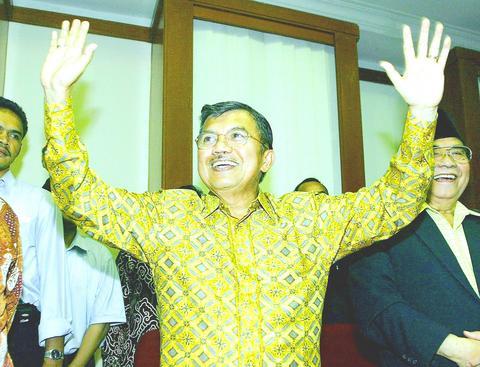Indonesian presidential favorite Susilo Bambang Yudhoyono has picked a respected Cabinet member as his running mate for the July 5 election, officials said yesterday, dealing a blow to President Megawati Sukarnoputri.
Social welfare minister Jusuf Kalla would partner Yudhoyono in the country's presidential election, said Akbar Tandjung, chairman of Golkar, the party of ousted autocrat Suharto.

PHOTO: EPA
"This morning, he said he will team up with Susilo Bambang Yudhoyono for the presidential poll," Tandjung said, but brushed off suggestions the move would hurt Golkar.
Kalla was one of several candidates for the Golkar ticket and Megawati had also been courting him as a running mate.
Megawati's Indonesia Democratic Party-Struggle (PDI-P) is running second to Golkar with about two-thirds of the ballots counted from the April 5 parliamentary election.
Kalla is expected to follow Yudhoyono's example and quit her Cabinet in the next few days.
Yudhoyono was Megawati's chief security minister until he resigned last month. He has since surged to become presidential favorite.
The new president and vice president will not be sworn in until Oct. 20, raising questions over the cohesion of Indonesia's government in the coming months, especially if more key ministers quit to pursue their political ambitions.
Kalla met Tandjung yesterday and announced his withdrawal from Golkar's contest to choose a presidential candidate. Kalla declined to answer questions about Yudhoyono and said he would hold a news conference later on the matter.
Yudhoyono has not commented either, although the official Antara news agency quoted him as saying Kalla would join his ticket.
Golkar is leading in the parliamentary election with 21 percent of the vote, followed by Megawati's PDI-P with 19.5 percent. Golkar is expected to widen its lead as more votes are counted from outlying areas, where it has a traditional base in the world's most populous Muslim nation.
But the big established parties are discovering that a well-oiled party machine, a key factor in the parliamentary poll, might not be a match for personal popularity when the country conducts its first, direct presidential election.
While Kalla is not expected to win nomination at Golkar's convention to be held today and tomorrow over several other stronger party cadres, including Tandjung, he has been one of the best performers in Megawati's cabinet.
Kalla has solid Muslim credentials and played a key role halting religious violence in Indonesia's east in recent years.
He is also a leading businessman from his home base in eastern Sulawesi island, complementing Yudhoyono, who comes from the main island of Java and who has strength on security issues.
Political analysts expect Megawati will be left trying to strike a deal with Vice President Hamzah Haz, or Hasyim Muzadi, head of the country's biggest moderate Muslim group in her search for a running mate.

Auschwitz survivor Eva Schloss, the stepsister of teenage diarist Anne Frank and a tireless educator about the horrors of the Holocaust, has died. She was 96. The Anne Frank Trust UK, of which Schloss was honorary president, said she died on Saturday in London, where she lived. Britain’s King Charles III said he was “privileged and proud” to have known Schloss, who cofounded the charitable trust to help young people challenge prejudice. “The horrors that she endured as a young woman are impossible to comprehend and yet she devoted the rest of her life to overcoming hatred and prejudice, promoting kindness, courage, understanding

Tens of thousands of Filipino Catholics yesterday twirled white cloths and chanted “Viva, viva,” as a centuries-old statue of Jesus Christ was paraded through the streets of Manila in the nation’s biggest annual religious event. The day-long procession began before dawn, with barefoot volunteers pulling the heavy carriage through narrow streets where the devout waited in hopes of touching the icon, believed to hold miraculous powers. Thousands of police were deployed to manage crowds that officials believe could number in the millions by the time the statue reaches its home in central Manila’s Quiapo church around midnight. More than 800 people had sought

Cambodia’s government on Wednesday said that it had arrested and extradited to China a tycoon who has been accused of running a huge online scam operation. The Cambodian Ministry of the Interior said that Prince Holding Group chairman Chen Zhi (陳志) and two other Chinese citizens were arrested and extradited on Tuesday at the request of Chinese authorities. Chen formerly had dual nationality, but his Cambodian citizenship was revoked last month, the ministry said. US prosecutors in October last year brought conspiracy charges against Chen, alleging that he had been the mastermind behind a multinational cyberfraud network, used his other businesses to launder

Uncontrolled fires burned through bushland in the Australian state of Victoria yesterday, forcing communities to evacuate and authorities to warn of a “catastrophic” fire danger rating for today. Amid temperatures that exceeded 40°C in parts of the state, two large bushfires were raging near the towns of Longwood and Walwa. The fires had destroyed at least two structures and were expected to continue to spread today as heat and wind pick up, authorities said. The Longwood fire had grown to more than 25,000 hectares in size, while the Walwa fire was 10,000 hectares and has created its own weather system, with a pyrocumulonimbus